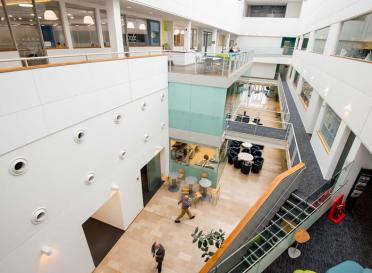Life at Earlham Institute
We believe that our people are our greatest asset, and we want you to have the freedom to achieve your very best work here.
This project is based in the Iain Macaulay Group at the Earlham Institute.
Microbiomes are integral to many of the fundamental processes affecting society – from healthcare to agriculture – but the complexity and diversity harboured within these microbiomes and the roles of individual cells/species in adaptation to new environments/stresses is still largely unexplored. Traditionally, microbiome complexity is assessed using a metagenomic approach, where DNA extracted from bulk microbial pools is sequenced and the relative abundance of individual species is inferred from the data.
In this project, we will bring single-cell genomics techniques to the study of complex, real-world microbiomes. This will enable access to rare, unculturable cells, from which we can generate detailed, rich genomic information. Such cells may only constitute a tiny subfraction of the overall population but may be critical for the overall impact or function of the microbial community. We hypothesise that the detailed whole-genome sequencing of rare microbiome components will reveal genetic diversity that cannot be observed by classical metagenomics approaches. Recent work from our lab has demonstrated the feasibility of single-cell, whole bacterial genome sequencing – with near complete genomes and single nucleotide variation data being attainable from single cells (Bawn et al. 2020).
Using a range of techniques, including FACS, single-cell genomics, next generation sequencing and bioinformatics, the student will develop tools to isolate and analyse the genomes of individual cells from complex microbiomes and will apply these advances to the study of rare components of human microbiomes, revealing the extent of genetic diversity in these populations, beyond what could be observed with classical metagenomics.
Based in the Macaulay lab at the Earlham Institute, the student will work in an active and collaborative research group, developing skills in cellular genomics, including cell sorting, single-cell genomics and next generation sequencing and bioinformatics, and will be encouraged to engage with the thriving, rapidly developing field of single-cell genomics through visits to collaborator labs.
Related Reading:
At least UK equivalence Bachelors (Honours) 2:1 or UK equivalence Master's degree. English Language requirement (Faculty of Science equivalent: IELTS 6.5 overall, 6 in each category).
Our group develops new sequencing approaches to address a diverse range of biological problems. One of the main focuses of the group is to establish and develop high-throughput single cell sequencing approaches.

We believe that our people are our greatest asset, and we want you to have the freedom to achieve your very best work here.

Norwich is a city of culture, with its rich history of art and writing, as well as a city of science - hosting some of the leading centres for life science research in the world.

The behaviours and communication skills we expect from candidates.